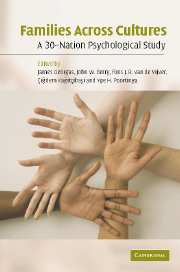Book contents
- Frontmatter
- Contents
- List of figures
- List of tables
- List of contributors
- Acknowledgments
- Prologue
- Part I
- Part II
- 9 The Algerian family: change and solidarity
- 10 Botswana
- 11 The Brazilian jeitinho: Brazil's sub-cultures, its diversity of social contexts, and its family structures
- 12 Britain
- 13 Bulgaria: socialism and open-market economy
- 14 Canada
- 15 Chile: new bottle, old wine
- 16 Cyprus
- 17 Portrait of family in France
- 18 Georgia
- 19 Germany: continuity and change
- 20 Ghana
- 21 Greece
- 22 Hong Kong, SAR China: transitions and return to the motherland
- 23 India
- 24 Indonesia: traditional family in a changing society
- 25 The Iranian family in a context of cultural diversity
- 26 Japan: tradition and change in the Japanese family
- 27 Mexico
- 28 Mongolia: traditions and family portrait
- 29 The Netherlands: tolerance and traditionalism
- 30 Nigeria
- 31 Pakistan: culture, community, and filial obligations in a Muslim society
- 32 The Saudi society: tradition and change
- 33 The South African family
- 34 South Korea
- 35 Spain: tradition and modernity in family structure and values
- 36 Turkey
- 37 Ukraine
- 38 Family in the United States: social context, structure, and roles
- Appendix
- References
- Index
21 - Greece
Published online by Cambridge University Press: 10 December 2009
- Frontmatter
- Contents
- List of figures
- List of tables
- List of contributors
- Acknowledgments
- Prologue
- Part I
- Part II
- 9 The Algerian family: change and solidarity
- 10 Botswana
- 11 The Brazilian jeitinho: Brazil's sub-cultures, its diversity of social contexts, and its family structures
- 12 Britain
- 13 Bulgaria: socialism and open-market economy
- 14 Canada
- 15 Chile: new bottle, old wine
- 16 Cyprus
- 17 Portrait of family in France
- 18 Georgia
- 19 Germany: continuity and change
- 20 Ghana
- 21 Greece
- 22 Hong Kong, SAR China: transitions and return to the motherland
- 23 India
- 24 Indonesia: traditional family in a changing society
- 25 The Iranian family in a context of cultural diversity
- 26 Japan: tradition and change in the Japanese family
- 27 Mexico
- 28 Mongolia: traditions and family portrait
- 29 The Netherlands: tolerance and traditionalism
- 30 Nigeria
- 31 Pakistan: culture, community, and filial obligations in a Muslim society
- 32 The Saudi society: tradition and change
- 33 The South African family
- 34 South Korea
- 35 Spain: tradition and modernity in family structure and values
- 36 Turkey
- 37 Ukraine
- 38 Family in the United States: social context, structure, and roles
- Appendix
- References
- Index
Summary
A HISTORICAL OUTLINE OF GREECE
Greece was established as an independent nation state in 1822, having rebelled against the Ottoman Empire. Its present-day population is approximately 10,500,000 inhabitants. Athens is the capital, with 4,500,000 inhabitants. Greece became a member of the European Union in 1981.
ECOLOGICAL FEATURES
Greece is in southeastern Europe, situated at the base of the Balkan peninsula, with mountains as its spine and hundreds of islands in the Aegean, Ionian, and Cretan seas, few fertile plains, and, even today, small isolated communities in the mountains and on the many islands, and relatively large cities on the plains and by the sea. Its climate is Mediterranean with hot and dry summers and mild winters.
ORGANIZATION AND INSTITUTIONS OF SOCIETY
Economic organization
The ecological features of Greece shaped specific types of subsistence patterns which remained unchanged for hundreds of years. The plains, essentially broad valleys between mountains, permitted some cultivation of crops. Cities, often located near the sea on the serrated coastline, became trading and mercantile centers. In the mountains, the herding of goats and sheep, and vine and olive oil cultivation were widely found. Fishing was the standard mode of subsistence in communities by the sea, together with merchant shipping. During the past 20 years, the traditional forms of subsistence patterns have given way to decreased agriculture (20 percent), increased industrialization (20 percent) and services (60 percent) primarily related to tourism.
- Type
- Chapter
- Information
- Families Across CulturesA 30-Nation Psychological Study, pp. 344 - 352Publisher: Cambridge University PressPrint publication year: 2006
- 12
- Cited by



